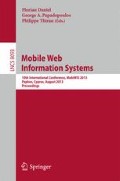Abstract
Mobile systems are determined by requirements which tend to change over time. Agile approaches seem to address this, but fail to provide reliable project plans, budget estimations and capacity forecasts. Thus, mobile enterprise applications demand for tamed agility, reconciling advantages of agile development and plan-driven approaches. In this paper, this tradeoff is addressed. The Interaction Room method is introduced as a low-tech method to support value-oriented development of mobile applications.
Access this chapter
Tax calculation will be finalised at checkout
Purchases are for personal use only
Preview
Unable to display preview. Download preview PDF.
References
Curtis, B., Krasner, H., Iscoe, N.: A field study of the software design process for large systems. Communications of the ACM 31(11), 1268–1287 (1988)
Kautz, K., Madsen, S., Nørbjerg, J.: Persistent problems and practices in information systems development. Inf. Sys. J. 17(3), 217–239 (2007)
Whitehead, J.: Collaboration in software engineering: A roadmap. In: Proc. Future of Software Engineering (FOSE 2007), pp. 214–225. IEEE Computer Society (2007)
Larman, C., Basili, V.: Iterative and incremental developments – a brief history. IEEE Computer 36(6), 47–56 (2003)
Boehm, B., Huang, L.: Value-based software engineering. ACM Software Engineering Notes 28, 4–10 (2003)
Davidson, E.: Joint application design (JAD) in practice. Journal of Systems and Software 45(3), 215–223 (1999)
Burge, J., Carroll, J., McCall, R., Mistrík, I.: Rationale-based software engineering. Springer (2008)
Schwaber, K., Beedle, M.: Agile Software Development with Scrum. Prentice Hall (2002)
Pavlovski, C.J., Zou, J.: Non-functional requirements in business process modeling. In: Proc. 5th Asia-Pacific Conference on Conceptual Modeling (APCCM 2008), pp. 103–112. Australian Computer Society (2008)
Bocciarelli, P., d’Ambrogio, A.: A BPMN extension for modeling non-functional properties of business processes. In: Proc. 2011 Symposium on Theory of Modeling & Simulation (TMS-DEVS 2011), pp. 160–168. Society for Computer Simulation (2011)
Author information
Authors and Affiliations
Editor information
Editors and Affiliations
Rights and permissions
Copyright information
© 2013 Springer-Verlag Berlin Heidelberg
About this paper
Cite this paper
Gruhn, V., Book, M. (2013). Tamed Agility in Developing Mobile Business Systems. In: Daniel, F., Papadopoulos, G.A., Thiran, P. (eds) Mobile Web Information Systems. MobiWIS 2013. Lecture Notes in Computer Science, vol 8093. Springer, Berlin, Heidelberg. https://doi.org/10.1007/978-3-642-40276-0_1
Download citation
DOI: https://doi.org/10.1007/978-3-642-40276-0_1
Publisher Name: Springer, Berlin, Heidelberg
Print ISBN: 978-3-642-40275-3
Online ISBN: 978-3-642-40276-0
eBook Packages: Computer ScienceComputer Science (R0)

